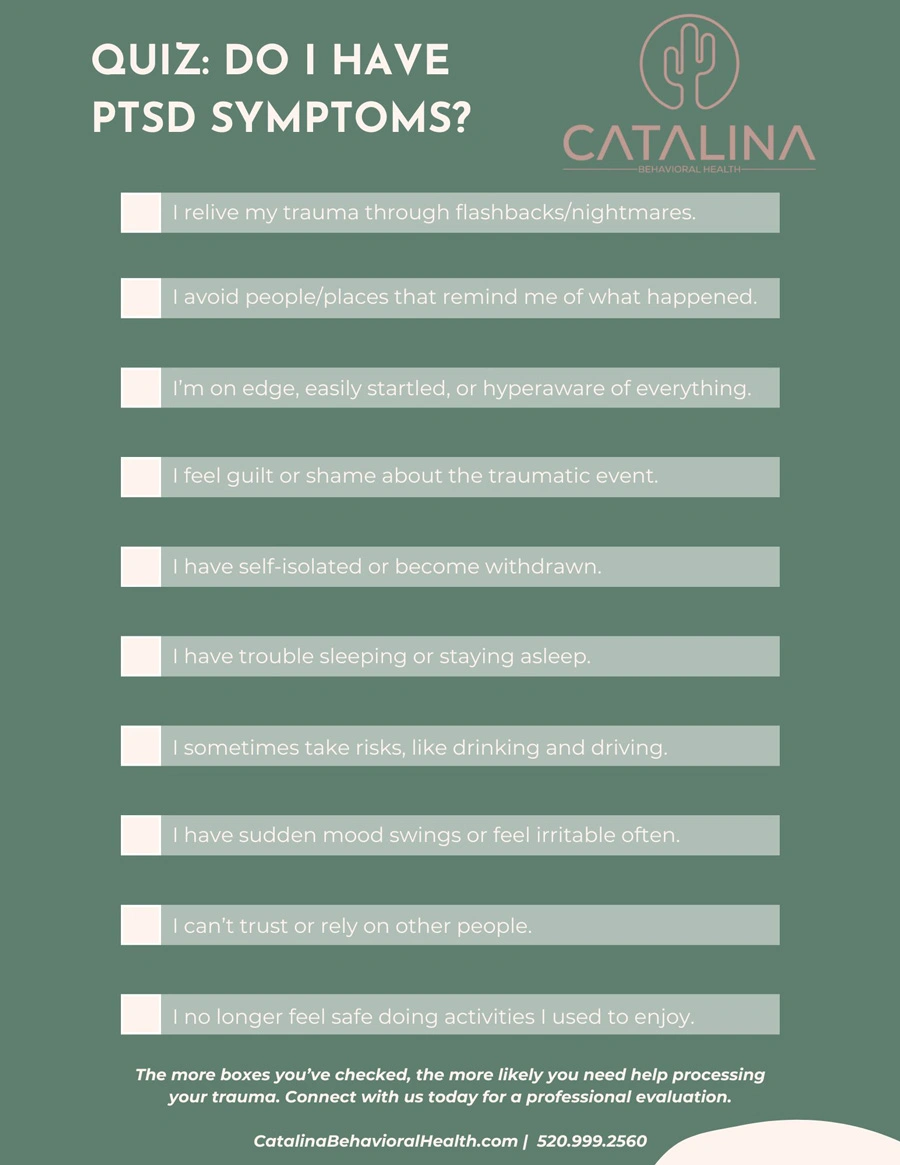How to Manage PTSD Episodes And Find Effective Treatment
Post-traumatic stress disorder can feel like hearing an emergency alarm sounding in the brain. The physical sensations in your body happen before your brain can sort out what’s happening.
You are not merely remembering the trauma – your central nervous system believes the traumatic event is happening again, right now.
The emotional and physical reactions of PTSD episodes can include intrusive memories, flashbacks, and nightmares. These take a toll on a person’s well-being and can lead to additional mental health conditions if left untreated.
Catalina Behavioral Health in Tucson is a Joint Commission-accredited treatment center; we’ve helped hundreds process their traumatic incident and learned to manage PTSD symptoms.
Don’t let the severe anxiety, panic attacks, and ongoing negative emotions rule your life. If you’re unsure if you’re having PTSD episodes or something else, we invite you to continue reading. The information you’ll find in this article will give you a better understanding of posttraumatic stress disorder and how it disrupts lives, as well as learn: what does a PTSD episode look like.
Get Confidential Trauma and PTSD Assessment – Call Now!
PTSD Is a Serious Mental Health Condition
Post-traumatic stress disorder, PTSD, is a mental disorder, and it can be life-changing in the most severe cases. The U.S. Department of Veterans Affairs has conducted extensive research on PTSD and follows the same criteria as the DSM-5 when diagnosing veterans.
PTSD affects a person’s thoughts, feelings, and responses in stressful situations. Some people with Post-traumatic Stress Disorder even have difficulty completing everyday tasks because of the distressing memories and disturbing thoughts racing around their brains.
Traumatic Events Can Mean a Need to Seek Professional Help
What are some of the events that can mean someone may develop PTSD? Here are a few causes of this mental illness:
- Actual or threatened death (of a loved one or threats to self)
- Receiving a life-changing diagnosis or a serious injury
- Childhood neglect or abuse (emotional and physical reactions often stem from this)
- Sexual violence or sexual assault
- Violent crimes or physical assaults
- Surviving horrific natural disasters, wars, or famine
- Extreme poverty, food insecurity, and homelessness
- Domestic violence or abuse
Any traumatic memories that make a person feel victimized or powerless can contribute to anxiety disorders or PTSD episodes. It’s also worth noting that PTSD symptoms, like flashbacks and intrusive memories, can be worse on significant dates like anniversaries of the trauma.
Common Symptoms of Post Traumatic Stress Disorder (PTSD)

The mood symptoms that are most associated with post-traumatic stress disorder, such as heightened anxiety, often overlap with other mental health disorders. If you are experiencing any of the symptoms below, it’s time to reach out to the licensed mental healthcare providers at Catalina Behavioral Health.
Our healthcare professionals will provide you with a thorough assessment, an accurate diagnosis, and a customized treatment plan to address your mental health needs. The short assessment below is a good starting point for considering if your behaviors may point to PTSD.
Intrusive Memories, Intense Flashbacks, and Nightmares
Recurring intrusive memories and flashbacks are the most easily identified signs of post-traumatic stress disorder. These PTSD episodes cause vivid, extreme fear, making the person feel as though they are actually reliving the traumatic event.
Similarly, they may experience nightmares, awakening with sweat, a rapid heartbeat, and distress. Falling asleep after a nightmare can be impossible, leaving the person exhausted and emotionally drained the following day.
Self-Destructive Behaviors and Even Suicidal Thoughts
Some with PTSD symptoms have emotional and physical pain so severe that it can lead them toward self-destructive behavior. They might also develop substance use disorders, drive recklessly, or engage in self-harm. These behaviors are a misplaced attempt to manage symptoms stemming from guilt or self-blame.
In the most severe circumstances, the person may have suicidal thoughts or feel such extreme hopelessness that they attempt suicide. If you or a loved one expresses these thoughts, consider it a life-threatening emergency. Call *988 or 911 for immediate help.
Trouble Concentrating
Many people with PTSD have difficulty focusing or getting things done. They may feel hypervigilant or anxious, which keeps them on edge. Sudden movements startle and distract them from tasks, sometimes for hours afterwards.
The brain constantly scans for non-existent danger, which admittedly feels real to the person with trauma, taking “bandwidth” away from daily tasks. Their careers or educational goals can suffer from these and other symptoms of PTSD. Loved ones may perceive them as “inattentive” or “uncaring” about relationships, especially if the person has not received a formal PTSD diagnosis.
Trouble Sleeping

Sleep disturbances are common in PTSD episodes. Nighttime anxiety and insomnia can make it hard to fall asleep, and overly alert body sensations can startle the person awake during their slumber. The lack of restful sleep can, in turn, worsen other symptoms.
Mental and physical exhaustion can spiral and lead to developing additional health concerns, both physical and mental.
Persistent Negative Thought Patterns
PTSD can lead to warped beliefs, making people mistrustful of the entire world. It can also mean low self-esteem and contribute to feelings of hopelessness. The person may believe they can’t trust anyone, even though the reality is that not everyone is out to “get them.”
Constant negativity may lead to verbal outbursts and pushing away their support system, making matters even worse in the future.
Physical Symptoms Along with Psychological Events
Trauma can also bring physical reactions and symptoms. People may have increased heart rate, muscle tension, headaches, or stomach issues during PTSD episodes. The physical responses come from an overtaxed stress response system and worsen without professional help.
Some people turn to a family doctor for the physical concerns, then receive a referral to a mental health professional – a process that delays treatment.
How the Mental Health Professionals at Catalina Can Help

Catalina Behavioral Health takes a trauma-informed approach, creating a supportive, compassionate environment for those who have survived a traumatic event. Whether you have single-incident PTSD or complex trauma, we will use evidence-based therapy and treatment to reduce symptoms.
Catalina clients receive treatment in a variety of settings, offering a well-rounded experience that includes individual therapy, family counseling, and peer support groups. No two treatment plans will be exactly alike, as we tailor each client’s plan to their individual treatment goals and psychological needs.
Cognitive Behavioral Therapy
Cognitive behavioral therapy is the mental health professional’s top choice for PTSD episodes. CBT helps the client connect the dots between the traumatic event and their ongoing PTSD episodes.
They learn to replace their typical negative thought patterns with positive emotions and thoughts, thereby gaining a more balanced perspective and feeling better.
Prolonged Exposure Therapy
Prolonged exposure therapy helps clients face the traumatic event and memories in a safe setting. The process helps them stop avoiding the trauma and lessen the emotional hold of their triggers.
It can particularly help those whose PTSD episodes involve flashbacks and intense bodily sensations or reactions to their trauma.
Eye Movement Desensitization and Reprocessing (EMDR)
EMDR helps the brain reprocess the disturbing thoughts of a PTSD episode through guided eye movements, which reduces the impact of trauma and makes it feel less overwhelming. A therapist guides the eye movements, often asking clients to follow their fingers or a moving light while recalling the trauma.
This helps the brain process the memory and store it in a less emotional part of the brain. EMDR can be highly effective for clients who have difficulty explaining their traumatic event in detail.
Grounding Techniques

Learning grounding techniques can help clients maintain a calm presence when they feel an oncoming PTSD episode. There is no specific “right” or “wrong” self-soothing technique; your counselors will help you find the tool that best suits you.
You may enjoy deep breathing exercises, journaling, prayer, or progressive muscle relaxation. We’ll be there to guide you as you learn to stay in the present moment.
Up To 100% of Rehab Costs Covered By Insurance
Catalina Provides Effective Help for People with PTSD
Don’t let traumatic events continue to take over your life. With professional help, PTSD episodes can be significantly minimized, allowing you to have trauma as part of your history without dictating your future success.
What are your next steps in resolving PTSD episodes?
It starts with calling Catalina. Our admissions counselors will discuss your traumatic event, help you determine your level of care (usually outpatient), and coordinate your insurance benefits. We make the process easy, allowing you to focus on overcoming your PTSD episodes without additional burden.
We are here for you right now – give us a quick, confidential call.







